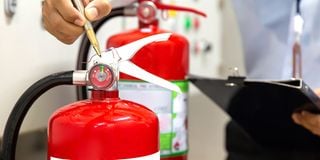Train your child on personal safety and emergency response

Mature learners, those who can carry, for instance, a fire extinguisher, then they can be shown how to use it.
Though it is a parent's discretion and choice to send their child to boarding school, the rising number of tragedies in these institutions is alarming.
In light of a devastating fire that claimed the lives of 21 children, it's crucial to urgently address child safety in boarding schools and the roles parents, management, and students must play in the face of such disasters.
Jonah Rotich, an education specialist with the United Nations Children's Fund (UNICEF), says that during school tragedies, there should always be an adult on site to guide and ensure children's safety.
That said, there is a lot that children could help with. Mr Rotich shares first, is on issues of self-awareness and personal safety. "Make sure that when they are in the dormitories, there is no clutter. They can know where the exits are. They are marked well for them to be able to exit whenever an incident happens.”
Also, Mr Rotich urges schools to have regular drills that mock situations that appear to be real fire situations so that learners can know how quickly they can evacuate their dormitory or classrooms and the safe assembly points they should run to.
"These drills could also allow the learner to interact with some fire safety equipment. So, for the more mature learners, those who are able to carry, for instance, a fire extinguisher, then they can be actually shown how to use it. So, you can even train some of them to be fire marshals within the schools."
Additionally, Mr Rotich, notes that learners should actively report safety concerns not only to the school management but also to their caregivers. If, for instance, learners are being overcrowded in a dormitory, then they can tell their parents who can take it up with the school management or ministry.”
The best way to be truly prepared is through careful planning. Mr Rotich suggests that schools, when creating an emergency preparedness plan, should post printed emergency numbers in strategic locations, of nearby fire extinguishers and health facilities.
"If it is arson being planned, and one of the learners gets to know this information, then they should be able to report this directly to the teacher. If they are afraid of being known, the school can provide boxes where they can report anonymously but teachers should open these boxes regularly," he adds.
It could also be prefects, like in institutions where learners have been involved in the selection of their officials, they feel more confident in confiding in them… so they can go to the class prefect, they go to the class president or governor and tell them, 'I think this is about to happen or I think this bulb is hanging loosely, it might cause a fire.'
Since some children are too young to manage self-evacuation in emergencies, the government should establish clear guidelines on the appropriate age for children to attend boarding schools.
Mr Rotich echoes, that they (the small children ) need to be cared for and handled in every situation so such instances like a fire incident can make things difficult for them.
However, after the learners have prioritised their safety, they can help in fetching water, accounting for their classmates but not coming close to the fire.
"Always make sure there is an adult who is guiding and coordinating them within spaces where they are safe and comfortable."





